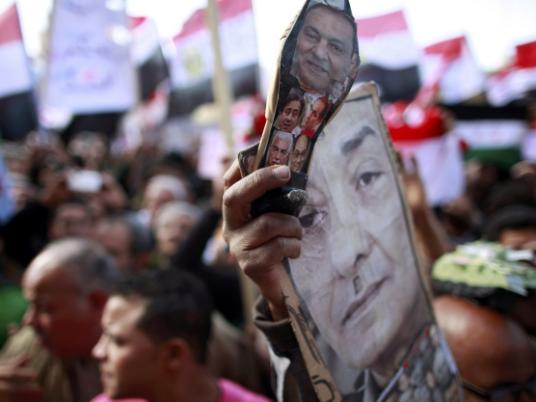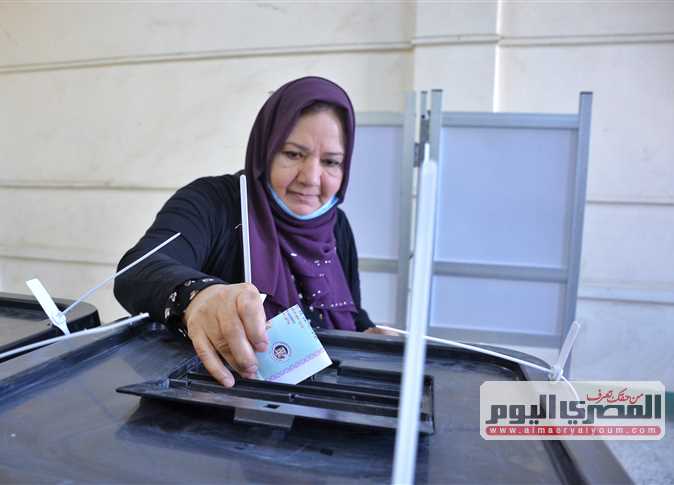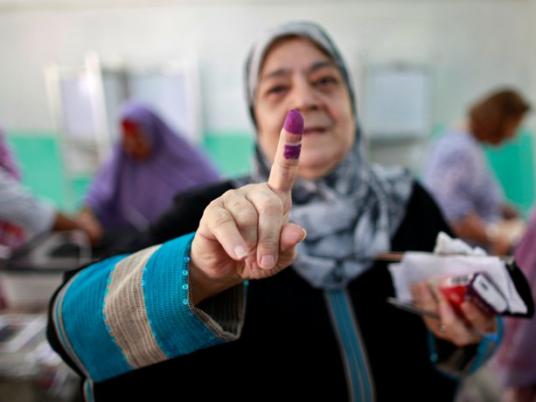
As the curtains seem to draw on the resurgent street demonstrations marking the anniversary of the beginning of the 25 January revolution, one of the revolutionary forces’ main demands continues to echo: urging the ruling military council to cede power.
Many political parties, activist groups and prominent personalities have put forth their own proposals and suggestions regarding proposed dates and methods for a transfer of the country’s executive power from the Supreme Council of the Armed Forces to an elected individual or entity.
“We can’t stay quiet while the authorities sit around and decide on their own what the path forward will be,” said Wael Khalil, an activist and member of the consensus-building organization Masrena (Our Egypt). Khalil believes that whatever the eventual transfer plan ends up being, it is the role of civil societies and political groups to maintain pressure on the SCAF to be responsive to popular demands and elected authorities and, most importantly, to avoid a scenario in which the SCAF postpones the handover of power.
Masrena has begun an initiative called “The President First,” which calls for moving forward the date for the military to transfer power, while insisting on making sure the constitution is not written under SCAF supervision, in accordance with the result of the 19 March constitutional referendum.
“If we allow the constitution to be formed under SCAF, any postponement of the constitution will also mean the SCAF will have an opportunity to prolong its reign and hold the people hostage for longer,” Khalil said.
Some of the initiatives recommend — or insist on — an immediate transfer of power, but they also leave the door open for different transfer scenarios. One-time presidential hopeful Mohamed EBaradei recently suggested that Egypt follow the Tunisian model, in which the SCAF immediately transfers power to an interim president who would be elected by members of Parliament, followed by writing the constitution, and finally choosing a president through popular elections.
On Saturday, a group of 27 political groups released a statement demanding that the SCAF hand over all executive powers to Parliament and that the process of choosing a president immediately begin under parliamentary supervision.
“The main goal of this initiative is to end SCAF control immediately and to ensure that the presidential election does not happen under their supervision,” said Marwa Farouk, a member of the Socialist Popular Alliance Party, one of the signatories to the statement. The 25 January Revolution Youth Coalition, April 6 Youth Movement–Democratic Front, Maspero Youth Union and moderate Islamist Wasat Party also signed the statement.
Statements such as these would pit the Muslim Brotherhood, which has the largest bloc of seats in the recently elected People's Assembly, against the SCAF on the off-chance they would accept. Brotherhood members have said they will accept the SCAF's chosen timetable to hand over power by the end of June.
Brotherhood spokesman Mahmoud Ghazlan, however, recently said on a televised interview that the group is open to initiatives that would push this date forward. Hussein Ibrahim, the People's Assembly majority leader and member of the Freedom and Justice Party, stated his party’s refusal to hand over power to the speaker of the People’s Assembly. The FJP has generally avoided confronting the military council, as evidenced by its decision to only celebrate the 25 January anniversary rather than join street protests to continue the revolution and call on the SCAF to relinquish power.
Some believe that forcing a standoff between Parliament and the SCAF would be premature.
“Calling for the transfer of presidential powers to Parliament is tantamount to calling on the Brotherhood to declare war on the SCAF,” wrote Gilbert Achcar, a Middle East political economy expert and professor at the School of Oriental and African Sciences at the University of London, on his blog.
Farouk, however, is unperturbed by the fact that her group’s demands are at odds with both the largest parliamentary bloc and the SCAF.
“We’re asking Parliament as an institution to take over power. There’s an element of the demand that will naturally corner the Brotherhood into taking a position, and if the SCAF indeed has them in their pockets, then we will know based on what decision they take,” she said.
Khalil does not believe the Brotherhood’s position is yet clear.
“The Brotherhood is one of the groups that respond to public pressure. There is still a lot of room for negotiation and consensus building with them,” he said.
Many of those calling on the SCAF to transfer power to Parliament believe the demand is legitimate despite its lack of legal precedent.
“We can only raise demands to the Parliament, because it is the only legitimate elected authority in the country,” said activist Alaa Abd El Fattah.
The 27-group statement does not specify who should assume executive power in the transitional period between 11 February and April — when Farouk estimates a new president could be elected — just that it should be up to Parliament to decide.
Achcar says it is unfathomable that Parliament would actually be able to wield executive authority, even if it is nominally in its hands.
Khalil and Farouk believe that inherent in their respective proposals is a desire to open up all issues pertaining to military authority and economic interests.
The only guarantee they still have is public pressure, Farouk said.
“As evidenced by the immense turnout in the streets over the past weeks, the street is still powerful, and it will be our main guarantee."




